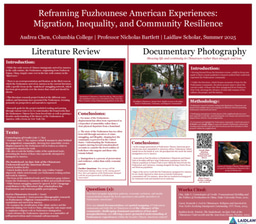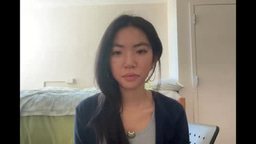- While all Laidlaw Scholars will be presenting their research at the Columbia Undergraduate Research Symposium in the fall, what are the more immediate expectations that you have for your research? Are you writing a paper? Will your research be part of a larger scientific study? Do you hope to produce an annotated bibliography that you reflect on down the line? Is your research now the first phase of a project you’ll continue to work on throughout the year, and/or next summer? Now that we are nearing the one-month mark of the program, please write about your expectations for your research.
I hope to produce an annotated bibliography that reflects the different narratives I’ve encountered surrounding the Fuzhounese Chinese-American community. In terms of my immediate expectations, I also aim to create a visual component to complement my research through my photography project. Whether that takes the form of an online collection or a zine, I hope to present it alongside my poster. My research has changed drastically from week to week, both as a result of my growing knowledge of different research methods and my desire to go beyond just a literature review. I’ve worked closely with my smaller graduate student mentor group and my professor to evaluate where I might need to scale back my aspirations a bit, and where I might be able to go even further.
- Why does your research matter? Explain the significance of the question you are investigating, and why you are interested in it.
As with any research involving underrepresented groups, my work matters because it serves as a tangible sign that we matter– that the Fuzhounese deserve to maintain a place in modern-day academia. My research centers on exploring the narratives surrounding Fuzhounese Chinese-Americans, beginning with the existing literature and expanding into visual representation through photography.
The roots of the often imperceptible biases against the Fuzhounese community have become clearer to me through my study of literature and my efforts to learn Fuzhounese, the dialect. Through the online site Preply, I’ve been taking lessons with a Mandarin tutor based in Fujian. Speaking with her, both in Mandarin and Fuzhounese, has revealed another layer to my research which is one I had considered but hadn’t fully understood: the difficulty of sustaining a community that speaks a language so hard to learn and so under-resourced. Fuzhounese is arguably the most difficult Chinese dialect to learn, especially because of the lack of proper teaching materials. This language difference has not only excluded us from opportunities more readily available to Chinese immigrants who speak Mandarin, but has also created additional hurdles to assimilation. I didn’t realize how deeply I’d immersed myself in this research until I started reflecting on all the moving parts that have shaped my understanding of the Fuzhounese condition in New York.
Today, I had the chance to speak with the Fuzhou Sisters, two friends who post Fuzhounese content on social media and host events for both the Fuzhounese community and the broader Chinese community in NYC. I first came across them while scrolling through Instagram one night. Although the video I found was about a silly online trend, I was shocked to hear people so young speaking Fuzhounese. Fuzhounese is (using a phrase I just learned) a kitchen language for me: something I’ve mainly encountered in the context of home and family, with my understanding of it limited to what I’ve learned there. Realizing how surprised I was to hear it spoken outside that context inspired me to look more deeply into the Fuzhounese experience. Meeting the Fuzhou Sisters and hearing about their motivations felt like a full-circle moment.
All of this is to say that my research is about finding a way to express and preserve the stories of the Fuzhounese in a less prejudiced way and about taking the first step toward properly documenting the stories of our elders, not only for our community in isolation, but so that others might recognize the struggles and triumphs of the Fuzhounese.


Please sign in
If you are a registered user on Laidlaw Scholars Network, please sign in
I definitely understand the shift in expectations progressing through your research project, I've also had to change my goals for my project as I've made some necessary changes in how I present my findings. Props to you for honing your skills in Mandarin and Fuzhounese, I can imagine the challenges that come with researching a community where there is language barrier. I'm so excited to learn more about your project and I am wishing you all the best.